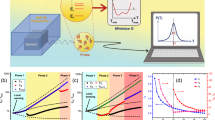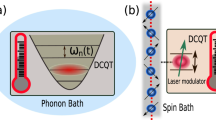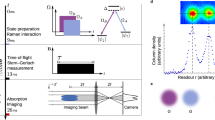Abstract
Over the past 60 years, a considerable number of theories and experiments have claimed the existence of negative absolute temperature in spin systems and ultracold quantum gases. This has led to speculation that ultracold gases may be dark-energy analogues and also suggests the feasibility of heat engines with efficiencies larger than one. Here, we prove that all previous negative temperature claims and their implications are invalid as they arise from the use of an entropy definition that is inconsistent both mathematically and thermodynamically. We show that the underlying conceptual deficiencies can be overcome if one adopts a microcanonical entropy functional originally derived by Gibbs. The resulting thermodynamic framework is self-consistent and implies that absolute temperature remains positive even for systems with a bounded spectrum. In addition, we propose a minimal quantum thermometer that can be implemented with available experimental techniques.
This is a preview of subscription content, access via your institution
Access options
Subscribe to this journal
Receive 12 print issues and online access
$209.00 per year
only $17.42 per issue
Buy this article
- Purchase on Springer Link
- Instant access to full article PDF
Prices may be subject to local taxes which are calculated during checkout

Similar content being viewed by others
References
Callen, H. B. Thermodynamics and an Introduction to Thermostatics (Wiley, 1985).
Ramsay, N. F. Thermodynamics and statistical mechanics at negative absolute temperatures. Phys. Rev. 103, 20–28 (1956).
Landsberg, P. T. Heat engines and heat pumps at positive and negative absolute temperature. J. Phys. A 10, 1773–1780 (1977).
Rapp, A., Mandt, S. & Rosch, A. Equilibration rates and negative absolute temperatures for ultracold atoms in optical lattices. Phys. Rev. Lett. 105, 220405 (2010).
Purcell, E. M. & Pound, R. V. A nuclear spin system at negative temperature. Phys. Rev. 81, 279–280 (1951).
Hakonen, P. & Lounasmaa, O. V. Negative absolute temperature—hot spins in spontaneous magnetic order. Science 265, 1821–1825 (1994).
Braun, S. et al. Negative absolute temperature for motional degrees of freedom. Science 339, 52–55 (2013).
Peebles, P. J. & Ratra, B. The cosmological constant and dark energy. Rev. Mod. Phys. 75, 559–606 (2003).
Loeb, A. Thinking outside the simulation box. Nature Phys. 9, 384–386 (2013).
Carr, L. D. Negative temperatures? Science 339, 42–43 (2013).
Sommerfeld, A. Vorlesungen über Theoretische Physik (Band 5): Thermodynamik und Statistik 181–183 (Verlag Harri Deutsch, 2011).
Khinchin, A. I. Mathematical Foundations of Statistical Mechanics (Dover, 1949).
Huang, K. Statistical Mechanics 2nd edn (Wiley, 1987).
Gibbs, J. W. Elementary Principles in Statistical Mechanics (Dover, 1960) (Reprint of the 1902 edition).
Campisi, M., Talkner, P. & Hänggi, P. Fluctuation theorem for arbitrary open quantum systems. Phys. Rev. Lett. 102, 210401 (2009).
Campisi, M. & Kobe, D. Derivation of the Boltzmann principle. Am. J. Phys. 78, 608–615 (2010).
Dunkel, J. & Hilbert, S. Phase transitions in small systems: Microcanonical vs. canonical ensembles. Physica A 370, 390–406 (2006).
Votyakov, E V., Hidmi, H. I., De Martino, A. & Gross, D. H. E. Microcanonical mean-field thermodynamics of self-gravitating and rotating systems. Phys. Rev. Lett. 89, 031101 (2002).
Becker, R. Theory of Heat (Springer, 1967).
Campisi, M. Thermodynamics with generalized ensembles: The class of dual orthodes. Physica A 385, 501–517 (2007).
Hertz, P. Über die mechanischen Grundlagen der Thermodynamik. Ann. Phys. (Leipz.) 33 225–274; 537–552 (1910).
Hoffmann, D. ‘... you can’t say anyone to their face: your paper is rubbish.’ Max Planck as Editor of Annalen der Physik. Ann. Phys. (Berlin) 17, 273–301 (2008).
Einstein, A. Bemerkungen zu den P. Hertzschen Arbeiten:‘Über die mechanischen Grundlagen der Thermodynamik’. Ann. Phys. (Leipz.) 34, 175–176 (1911).
Campisi, M. On the mechanical foundations of thermodynamics: The generalized Helmholtz theorem. Stud. Hist. Philos. Mod. Phys. 36, 275–290 (2005).
Stanley, R. P. Enumerative Combinatorics 2nd edn, Vol. 1 (Cambridge Studies in Advanced Mathematics, Cambridge Univ. Press, 2000).
Tremblay, A-M. Comment on ‘Negative Kelvin temperatures: Some anomalies and a speculation’. Am. J. Phys. 44, 994–995 (1975).
Dunkel, J., Hänggi, P. & Hilbert, S. Nonlocal observables and lightcone averaging in relativistic thermodynamics. Nature Phys. 5, 741–747 (2009).
Acknowledgements
We thank I. Bloch, W. Hofstetter and U. Schneider for constructive discussions. We are grateful to M. Campisi for pointing out equation (14), and to P. Kopietz, P. Talkner, R. E. Goldstein and, in particular, P. Hänggi for helpful comments.
Author information
Authors and Affiliations
Contributions
All authors contributed to all aspects of this work.
Corresponding author
Ethics declarations
Competing interests
The authors declare no competing financial interests.
Supplementary information
Supplementary Information
Supplementary Information (PDF 581 kb)
Rights and permissions
About this article
Cite this article
Dunkel, J., Hilbert, S. Consistent thermostatistics forbids negative absolute temperatures. Nature Phys 10, 67–72 (2014). https://doi.org/10.1038/nphys2815
Received:
Accepted:
Published:
Issue Date:
DOI: https://doi.org/10.1038/nphys2815
This article is cited by
-
Work, Heat and Internal Energy in Open Quantum Systems: A Comparison of Four Approaches from the Autonomous System Framework
Journal of Statistical Physics (2024)
-
On the thermodynamic entropy in the microcanonical ensemble of classical systems
Journal of the Korean Physical Society (2024)
-
Some Positive Thoughts about Negative Absolute Temperature
Resonance (2024)
-
Droplet to soliton crossover at negative temperature in presence of bi-periodic optical lattices
Scientific Reports (2022)
-
Adiabatic invariant and the thermodynamic entropies of equilibrium ensembles
Journal of the Korean Physical Society (2022)



